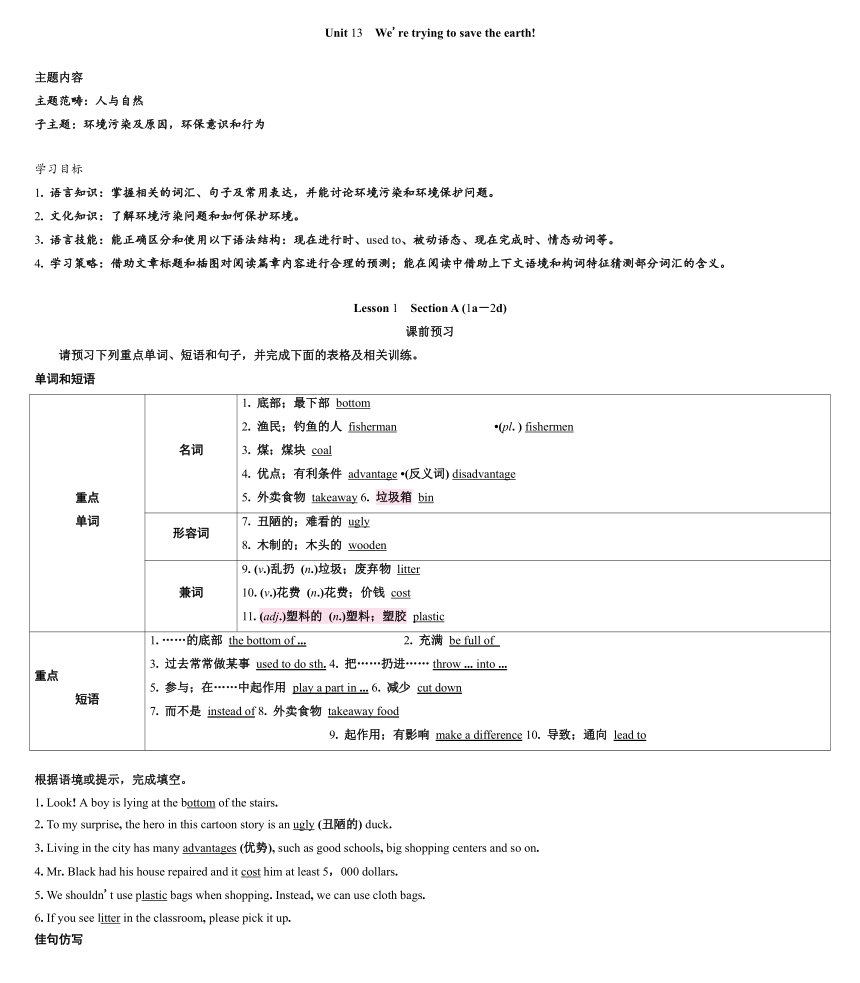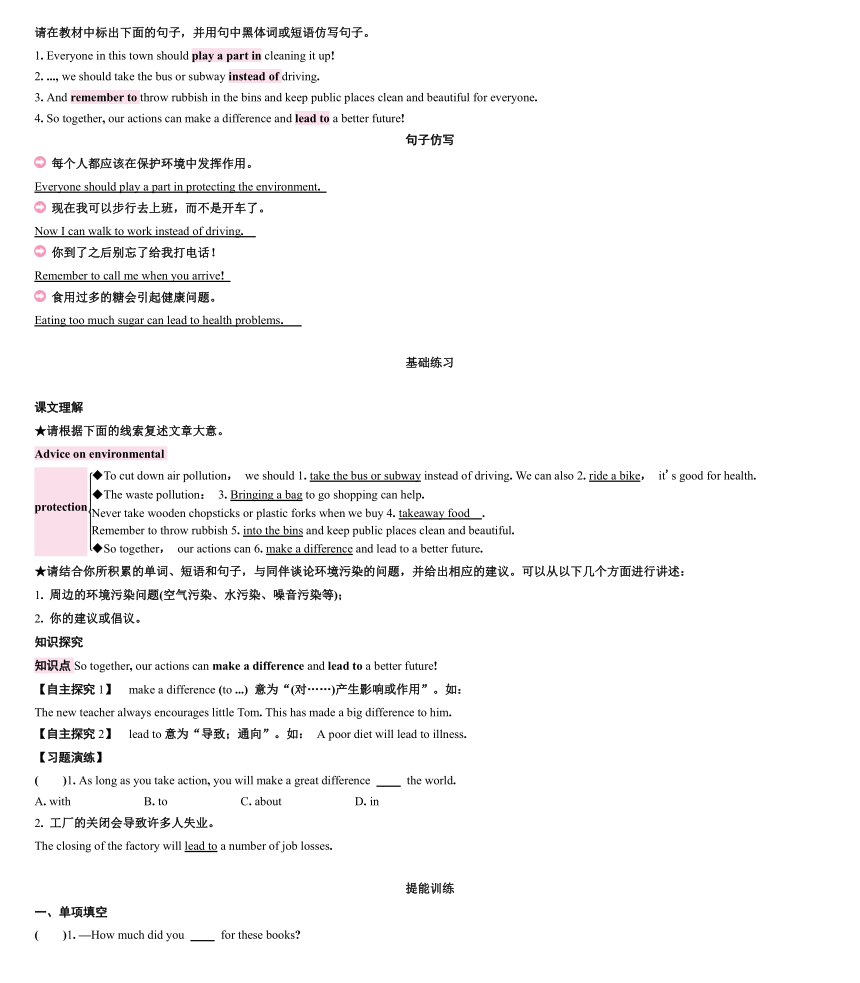人教版九年级全册Unit 13 We're trying to save the earth! Lesson 1 Section A (1a-2d) 导学案 (含部分答案)
文档属性
| 名称 | 人教版九年级全册Unit 13 We're trying to save the earth! Lesson 1 Section A (1a-2d) 导学案 (含部分答案) |

|
|
| 格式 | docx | ||
| 文件大小 | 31.6KB | ||
| 资源类型 | 教案 | ||
| 版本资源 | 人教新目标(Go for it)版 | ||
| 科目 | 英语 | ||
| 更新时间 | 2023-09-08 19:45:38 | ||
图片预览


文档简介
Unit 13 We're trying to save the earth!
主题内容
主题范畴:人与自然
子主题:环境污染及原因,环保意识和行为
学习目标
1. 语言知识:掌握相关的词汇、句子及常用表达,并能讨论环境污染和环境保护问题。
2. 文化知识:了解环境污染问题和如何保护环境。
3. 语言技能:能正确区分和使用以下语法结构:现在进行时、used to、被动语态、现在完成时、情态动词等。
4. 学习策略:借助文章标题和插图对阅读篇章内容进行合理的预测;能在阅读中借助上下文语境和构词特征猜测部分词汇的含义。
Lesson 1 Section A (1a-2d)
课前预习
请预习下列重点单词、短语和句子,并完成下面的表格及相关训练。
单词和短语
重点 单词 名词 1. 底部;最下部 bottom 2. 渔民;钓鱼的人 fisherman (pl. ) fishermen 3. 煤;煤块 coal 4. 优点;有利条件 advantage (反义词) disadvantage 5. 外卖食物 takeaway 6. 垃圾箱 bin
形容词 7. 丑陋的;难看的 ugly 8. 木制的;木头的 wooden
兼词 9. (v.)乱扔 (n.)垃圾;废弃物 litter 10. (v.)花费 (n.)花费;价钱 cost 11. (adj.)塑料的 (n.)塑料;塑胶 plastic
重点 短语 1. ……的底部 the bottom of ... 2. 充满 be full of 3. 过去常常做某事 used to do sth. 4. 把……扔进…… throw ... into ... 5. 参与;在……中起作用 play a part in ... 6. 减少 cut down 7. 而不是 instead of 8. 外卖食物 takeaway food 9. 起作用;有影响 make a difference 10. 导致;通向 lead to
根据语境或提示,完成填空。
1. Look! A boy is lying at the bottom of the stairs.
2. To my surprise, the hero in this cartoon story is an ugly (丑陋的) duck.
3. Living in the city has many advantages (优势), such as good schools, big shopping centers and so on.
4. Mr. Black had his house repaired and it cost him at least 5,000 dollars.
5. We shouldn't use plastic bags when shopping. Instead, we can use cloth bags.
6. If you see litter in the classroom, please pick it up.
佳句仿写
请在教材中标出下面的句子,并用句中黑体词或短语仿写句子。
1. Everyone in this town should play a part in cleaning it up!
2. ..., we should take the bus or subway instead of driving.
3. And remember to throw rubbish in the bins and keep public places clean and beautiful for everyone.
4. So together, our actions can make a difference and lead to a better future!
句子仿写
每个人都应该在保护环境中发挥作用。
Everyone should play a part in protecting the environment.
现在我可以步行去上班,而不是开车了。
Now I can walk to work instead of driving.
你到了之后别忘了给我打电话!
Remember to call me when you arrive!
食用过多的糖会引起健康问题。
Eating too much sugar can lead to health problems.
基础练习
课文理解
★请根据下面的线索复述文章大意。
Advice on environmental protection
★请结合你所积累的单词、短语和句子,与同伴谈论环境污染的问题,并给出相应的建议。可以从以下几个方面进行讲述:
1. 周边的环境污染问题(空气污染、水污染、噪音污染等);
2. 你的建议或倡议。
知识探究
知识点So together, our actions can make a difference and lead to a better future!
【自主探究1】 make a difference (to ...) 意为“(对……)产生影响或作用”。如:
The new teacher always encourages little Tom. This has made a big difference to him.
【自主探究2】 lead to意为“导致;通向”。如: A poor diet will lead to illness.
【习题演练】
( )1. As long as you take action, you will make a great difference the world.
A. with B. to C. about D. in
2. 工厂的关闭会导致许多人失业。
The closing of the factory will lead to a number of job losses.
提能训练
一、单项填空
( )1. —How much did you for these books
—They me more than 80 yuan.
A. take; cost B. pay; cost
C. spend; cost D. pay; take
( )2. —Can I throw the rubbish the river
—Of course not. Everyone should play a part keeping the river clean.
A. in; for B. to; for
C. into; by D. into; in
( )3. (2022·温州中考) In China, people usually their houses to sweep away bad luck before the Spring Festival.
A. clean up B. look up
C. make up D. put up
( )4. Schools and parents are trying to some of the students' homework.
A. turn down B. cut down
C. take off D. put off
( )5. (2022·达州中考) —Bruce so much in the past two years.
—Yeah, he be shy, but now he is confident and active.
A. has changed; used to B. changed; is used to
C. changed; used to D. has changed; is used to
二、单句选词填空
get play advantage ride wood
1. There is a small wooden bridge over the river.
2. Mr. Black is used to getting up early. He reads books in the morning.
3. Other activities include horse riding, hiking and fishing.
4. You'd better weigh the advantage and disadvantage of this choice. Think over before you act.
5. The boy always sat there writing instead of playing with other.
三、情景对话(课本Section A, 1b改编)
请通读下面对话,根据对话内容,从方框内的选项中选出能填入空白处的最佳选项,选项中有一项为多余选项。
A. Why not
B. Good idea!
C. Yeah, let's go!
D. What do you think has caused this problem
E. Factories are also putting waste into the river.
F. What about going swimming in the river this afternoon?
Tony: Hey, Mark. 1. F
Mark: I don't think I want to go, Tony.
Tony: 2. A
Mark: I was there last weekend and the river was really dirty.
Tony: No way! It used to be so clean. 3. D
Mark: Hmm ... I think people are throwing litter into the river.
Tony: Anything else
Mark: 4. E
Tony: That's terrible! We should write to the government. They should close down the factories.
Mark: 5. B But I think everyone in this town should help to clean up the river, too.
主题内容
主题范畴:人与自然
子主题:环境污染及原因,环保意识和行为
学习目标
1. 语言知识:掌握相关的词汇、句子及常用表达,并能讨论环境污染和环境保护问题。
2. 文化知识:了解环境污染问题和如何保护环境。
3. 语言技能:能正确区分和使用以下语法结构:现在进行时、used to、被动语态、现在完成时、情态动词等。
4. 学习策略:借助文章标题和插图对阅读篇章内容进行合理的预测;能在阅读中借助上下文语境和构词特征猜测部分词汇的含义。
Lesson 1 Section A (1a-2d)
课前预习
请预习下列重点单词、短语和句子,并完成下面的表格及相关训练。
单词和短语
重点 单词 名词 1. 底部;最下部 bottom 2. 渔民;钓鱼的人 fisherman (pl. ) fishermen 3. 煤;煤块 coal 4. 优点;有利条件 advantage (反义词) disadvantage 5. 外卖食物 takeaway 6. 垃圾箱 bin
形容词 7. 丑陋的;难看的 ugly 8. 木制的;木头的 wooden
兼词 9. (v.)乱扔 (n.)垃圾;废弃物 litter 10. (v.)花费 (n.)花费;价钱 cost 11. (adj.)塑料的 (n.)塑料;塑胶 plastic
重点 短语 1. ……的底部 the bottom of ... 2. 充满 be full of 3. 过去常常做某事 used to do sth. 4. 把……扔进…… throw ... into ... 5. 参与;在……中起作用 play a part in ... 6. 减少 cut down 7. 而不是 instead of 8. 外卖食物 takeaway food 9. 起作用;有影响 make a difference 10. 导致;通向 lead to
根据语境或提示,完成填空。
1. Look! A boy is lying at the bottom of the stairs.
2. To my surprise, the hero in this cartoon story is an ugly (丑陋的) duck.
3. Living in the city has many advantages (优势), such as good schools, big shopping centers and so on.
4. Mr. Black had his house repaired and it cost him at least 5,000 dollars.
5. We shouldn't use plastic bags when shopping. Instead, we can use cloth bags.
6. If you see litter in the classroom, please pick it up.
佳句仿写
请在教材中标出下面的句子,并用句中黑体词或短语仿写句子。
1. Everyone in this town should play a part in cleaning it up!
2. ..., we should take the bus or subway instead of driving.
3. And remember to throw rubbish in the bins and keep public places clean and beautiful for everyone.
4. So together, our actions can make a difference and lead to a better future!
句子仿写
每个人都应该在保护环境中发挥作用。
Everyone should play a part in protecting the environment.
现在我可以步行去上班,而不是开车了。
Now I can walk to work instead of driving.
你到了之后别忘了给我打电话!
Remember to call me when you arrive!
食用过多的糖会引起健康问题。
Eating too much sugar can lead to health problems.
基础练习
课文理解
★请根据下面的线索复述文章大意。
Advice on environmental protection
★请结合你所积累的单词、短语和句子,与同伴谈论环境污染的问题,并给出相应的建议。可以从以下几个方面进行讲述:
1. 周边的环境污染问题(空气污染、水污染、噪音污染等);
2. 你的建议或倡议。
知识探究
知识点So together, our actions can make a difference and lead to a better future!
【自主探究1】 make a difference (to ...) 意为“(对……)产生影响或作用”。如:
The new teacher always encourages little Tom. This has made a big difference to him.
【自主探究2】 lead to意为“导致;通向”。如: A poor diet will lead to illness.
【习题演练】
( )1. As long as you take action, you will make a great difference the world.
A. with B. to C. about D. in
2. 工厂的关闭会导致许多人失业。
The closing of the factory will lead to a number of job losses.
提能训练
一、单项填空
( )1. —How much did you for these books
—They me more than 80 yuan.
A. take; cost B. pay; cost
C. spend; cost D. pay; take
( )2. —Can I throw the rubbish the river
—Of course not. Everyone should play a part keeping the river clean.
A. in; for B. to; for
C. into; by D. into; in
( )3. (2022·温州中考) In China, people usually their houses to sweep away bad luck before the Spring Festival.
A. clean up B. look up
C. make up D. put up
( )4. Schools and parents are trying to some of the students' homework.
A. turn down B. cut down
C. take off D. put off
( )5. (2022·达州中考) —Bruce so much in the past two years.
—Yeah, he be shy, but now he is confident and active.
A. has changed; used to B. changed; is used to
C. changed; used to D. has changed; is used to
二、单句选词填空
get play advantage ride wood
1. There is a small wooden bridge over the river.
2. Mr. Black is used to getting up early. He reads books in the morning.
3. Other activities include horse riding, hiking and fishing.
4. You'd better weigh the advantage and disadvantage of this choice. Think over before you act.
5. The boy always sat there writing instead of playing with other.
三、情景对话(课本Section A, 1b改编)
请通读下面对话,根据对话内容,从方框内的选项中选出能填入空白处的最佳选项,选项中有一项为多余选项。
A. Why not
B. Good idea!
C. Yeah, let's go!
D. What do you think has caused this problem
E. Factories are also putting waste into the river.
F. What about going swimming in the river this afternoon?
Tony: Hey, Mark. 1. F
Mark: I don't think I want to go, Tony.
Tony: 2. A
Mark: I was there last weekend and the river was really dirty.
Tony: No way! It used to be so clean. 3. D
Mark: Hmm ... I think people are throwing litter into the river.
Tony: Anything else
Mark: 4. E
Tony: That's terrible! We should write to the government. They should close down the factories.
Mark: 5. B But I think everyone in this town should help to clean up the river, too.
同课章节目录
- Unit 1 How can we become good learners.
- Section A
- Section B
- Unit 2 I think that mooncakes are delicious!
- Section A
- Section B
- Unit 3 Could you please tell me where the restroom
- Section A
- Section B
- Unit 4 I used to be afraid of the dark.
- Section A
- Section B
- Unit 5 What are the shirts made of?
- Section A
- Section B
- Review of Units 1-5
- Unit 6 When was it invented?
- Section A
- Section B
- Unit 7 Teenagers should be allowed to choose their
- Section A
- Section B
- Unit 8 It must belong to Carla.
- Section A
- Section B
- Unit 9 I like music that I can dance to.
- Section A
- Section B
- Unit 10 You're supposed to shake hands.
- Section A
- Section B
- Review of Units 6-10
- Unit 11 Sad movies make me cry.
- Section A
- Section B
- Unit 12 Life is full of the unexpected
- Section A
- Section B
- Unit 13 We're trying to save the earth!
- Section A
- Section B
- Unit 14 I remember meeting all of you in Grade 7.
- Section A
- Section B
- Review of Units 11-14
